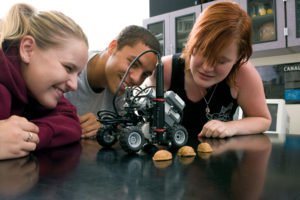Vernier Software & Technology recently announced science educator Tyson Vrbas of Manhattan Catholic Schools in Manhattan, Kansas as the 2021 Engineering Award winner. Vrbas, who worked with his middle school students to create an automatic watering system for the school garden, was recognized for his creative use of Vernier sensors to introduce engineering and robotics concepts or practices to his students.
In the project, Vrbas’ students utilized a Vernier Soil Moisture Sensor and LEGO® MINDSTORMS® EV3 kit to design a robot with the ability to monitor soil moisture and add water from a rain barrel when needed. Students programmed the robot so that a valve would automatically open—and then water the planter bed in the school garden—once the soil moisture minimum threshold was reached.
“I just presented the problem to my students and they took off with it,” said Vrbas. “Every student played a part, whether it was focusing on programming or engineering the valve motor or working on the barrel. They really collaborated and problem solved as a group and, in the end, developed a really awesome solution.”
This winning project was selected by a panel of Vernier experts based on its innovation, the engineering concepts being taught, and the ease by which other educators can use the project in their classrooms. Vrbas received $1,000 in cash, $3,000 in Vernier products, and $1,500 toward expenses to attend an upcoming National Science Teachers’ Association (NSTA) STEM conference or an American Society for Engineering Education (ASEE) conference.
Engineering educator Nels Lawrence of Kaukauna High School in Kaukauna, Wisconsin was also recognized with an honorable mention in this year’s award. During Lawrence’s project, which introduces programmable logic control (PLC) through a simulation of predictive failure, students gather vibration data using a Vernier accelerometer attached to a small electric motor and set an alarm using the Vernier Digital Control Unit. When a vibration above a certain threshold is detected, an LED lights up alerting students of a potential issue.
“Both of these projects exemplified creative uses of data-collection technology to teach students about engineering concepts and practices,” said John Wheeler, CEO of Vernier Software & Technology. “We hope these projects inspire other science and engineering educators who are looking for new ways to engage their students in hands-on learning as they problem-solve and iterate like real-world engineers.”
To learn more about the Vernier Engineering Award and this year’s winning projects, visit www.vernier.com/about-us/grants/engineering-contest.
About Vernier Software & Technology
Vernier Software & Technology has led the innovation of educational, scientific data-collection technology for 40 years. Vernier was founded by a former physics teacher and employs educators at all levels of the organization. The company is committed to teachers and to developing creative ways to teach and learn science, technology, engineering, and mathematics (STEM) using hands-on science. Vernier creates easy-to-use and affordable science interfaces, sensors, and graphing/analysis software. With worldwide distribution to over 150 countries, Vernier data loggers are used by educators and students from elementary school to university. Vernier technology-based solutions enhance STEM education, increase learning, build students’ critical thinking skills, and support the science and engineering practices detailed in the Next Generation Science Standards (NGSS). The Vernier business culture is grounded in Earth-friendly policies and practices, and the company provides a family-friendly workplace. For more information, visit www.vernier.com.

